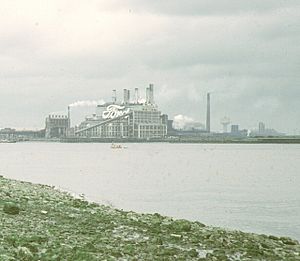Ford sewing machinists strike of 1968 facts for kids

The Ford sewing machinists strike was a very important event in 1968. It happened in England, United Kingdom. This strike was a big moment for workers' rights. It also helped lead to a new law called the Equal Pay Act 1970. This law made it illegal to pay men and women differently for the same work.
Contents
The Strike for Fair Pay
The strike began on June 7, 1968. It was led by six brave women: Rose Boland, Eileen Pullen, Vera Sime, Gwen Davis, Violet Dawson, and Sheila Douglass. These women were sewing machinists. They worked at the Ford Motor Company's factory in Dagenham, London. Later, machinists at Ford's Halewood factory also joined them.
Why the Women Went on Strike
The women sewed covers for car seats. Ford was changing how it paid its workers. The women were told their jobs were "Category C." This meant they were seen as less skilled. Men's jobs were often "Category B," which was for more skilled work. The women were going to be paid 15% less than men in Category B. At that time, it was common for companies to pay women less than men, even if they did the same work. The women felt this was unfair.
When the sewing machinists stopped working, there were no more seat covers. This meant that Ford could not make cars anymore. The strike eventually stopped all car production.
How the Strike Ended
The strike lasted for three weeks. A powerful politician named Barbara Castle, who was in charge of employment for the government, stepped in. She helped to find a solution. The women got a deal that increased their pay. They would now earn 8% less than men, and the next year, they would get the full Category B rate.
A special court was set up to look into their job grading. However, this court did not agree with the women. They were only officially moved to Category B after another six-week strike in 1984.
What Happened After the Strike
The Ford machinists inspired many other women. Women who were part of trade unions (groups that protect workers' rights) started a new group. It was called the National Joint Action Campaign Committee for Women's Equal Rights (NJACCWER).
This group held a big "equal pay protest" in London. About 1,000 people gathered in Trafalgar Square on May 18, 1969.
The Equal Pay Act of 1970
All this effort led to the Equal Pay Act 1970. This important law came into effect in 1975. For the first time, it aimed to stop unfair pay between men and women in Britain. It covered pay and other job conditions. During the debate about this law, a Member of Parliament (MP) named Shirley Summerskill said the machinists played a "very significant part" in the fight for equal pay.
In 1973, the UK joined the EEC (now the European Union). This meant the UK also had to follow a rule from 1957. This rule said that men and women should get equal pay for equal work.
The Strike on Screen and Stage
The story of the 1968 strike has been told in different ways.
A film called Made in Dagenham was made about the strike. It came out in September 2010. The story was written by William Ivory.
Later, the film was turned into a musical. The musical first opened in London in 2014. It ran until April 2015.
See also
- Equal pay for women
- United Kingdom employment equality law
- Feminist movement
- Automotive industry in the United Kingdom

